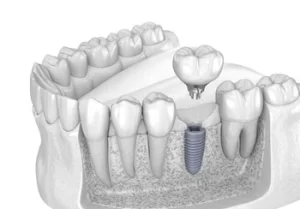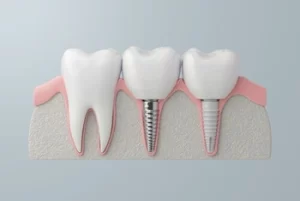When you undergo a dental implant procedure, it’s normal to experience a short period of tenderness while your mouth adjusts. Your gums, jaw bone, and surrounding tissues have just been through surgery, and the body begins its healing response immediately. Many patients report mild discomfort that typically subsides within a few days, while others may feel lingering tightness or swelling. Understanding what causes dental implant pain and learning the safest ways to manage it gives you a clear picture of what’s normal. With good oral hygiene, proper aftercare, and guidance from your dentist, most patients achieve a smooth recovery and long-term comfort.
Understanding Pain After A Dental Implant Procedure
After oral surgery, some degree of discomfort is a normal part of the body’s natural response. Recognising which sensations are expected and which require professional review helps you stay confident throughout your recovery process.
 What Happens During The Dental Implant Process
What Happens During The Dental Implant Process
A dental implant replaces missing teeth by inserting a titanium post into the jawbone, which acts as an artificial root. The surrounding gums adapt to the implant site through minor inflammation, beginning the healing process. Local anaesthesia used during the tooth implant procedure blocks pain during treatment, though mild soreness may appear once it wears off. This initial reaction means blood flow and tissue repair have started. The dental implant process sets the foundation for long-term stability, as the implant fuses naturally with bone tissue over time.
Why Some Discomfort Is A Normal Part Of Healing
Following dental implant surgery, mild discomfort reflects your body’s effort to rebuild tissue and stabilise the implant. Most patients describe a dull ache or tight feeling near the surgical area, which is temporary. Pain levels vary depending on bone density and overall dental health, but they usually improve after a few days. Swelling around the gums peaks within 48 hours, signalling a healthy inflammatory response. With patience and rest, tenderness typically lessens as the tissue strengthens and the implant integrates securely.
How Long Does Dental Implant Pain Typically Last
Pain duration depends on individual healing capacity and how well aftercare instructions are followed. Discomfort usually reduces steadily after the first few days post-surgery and continues improving over one to two weeks. The mouth adapts gradually, allowing the implant to settle firmly into the jawbone. However, if soreness or inflammation worsens instead of easing, it could indicate complications that need review. Monitoring how your body reacts during this time helps your dentist assess whether your recovery is progressing as expected.
When Mild Discomfort Becomes Severe Pain
While tenderness is typical, sharp or throbbing pain after the first few days should not be ignored. Severe pain, swelling that increases, or difficulty opening your mouth may point to infection or pressure on nearby nerves. If you experience pain that does not respond to over-the-counter medication, contact your dentist immediately for evaluation. Identifying the issue early protects the implant and surrounding structures. A calm and timely response often prevents further irritation and keeps your recovery on track.
Common Causes Of Pain And Sensitivity Around The Implant Site
Knowing what triggers discomfort provides valuable insight into how to relieve pain safely. Some causes are temporary, while others may require professional attention. Recognising them helps maintain confidence in the healing process and ensures your implant stays healthy.
Pain From Nerve Damage Or Excess Pressure
In rare cases, pain can result from nerve damage during implant placement. Patients might feel tingling or burning sensations in the chin, lips, or gums. Excess pressure on the implant area or incorrect bite alignment can also irritate nerves. This type of dental implant pain usually feels different from surgical tenderness and lasts longer if untreated. Early assessment by your dental team helps locate the cause and protect the affected tissue.
Gum Or Bone Irritation After Surgery
The gums and bone surrounding the implant need time to adjust after surgery. Friction from brushing too hard or disturbing the area too soon can irritate healing tissue. Over-cleaning the surgical site may worsen inflammation rather than relieve it. As the gums rebuild and form a seal around the implant, temporary sensitivity is expected. Allowing natural teeth and soft tissue time to adapt supports the healing process and reduces the risk of unnecessary discomfort.
 Implant Failure And Its Warning Signs
Implant Failure And Its Warning Signs
Implant failure may occur if the implant does not fuse properly with the jawbone. It can lead to persistent pain, swelling, or movement at the implant site. Bone quality, infection, or overloading the implant before full healing are common contributors. If these signs appear, your dentist will examine the area using X-rays to determine whether the implant remains stable. Recognising early indicators helps prevent further complications and supports a long-lasting result.
Pain Linked To Damaged Teeth Or Dental Crown Issues
Sometimes, pain stems not from the implant but from surrounding damaged teeth or an ill-fitting dental crown. A crown that sits unevenly can create friction against nearby teeth or gums. Pressure from chewing or grinding can aggravate this irritation, especially around the implant area. If your bite feels uneven or you hear a clicking sound while eating, an adjustment may be required.
Relieving Pain And Supporting A Smooth Recovery
Once pain sources are understood, you can focus on practical steps to manage discomfort and encourage faster healing. Combining gentle routines with professional advice keeps your mouth comfortable and safeguards your new implant.
Immediate Steps To Reduce Swelling And Manage Discomfort
Applying an ice pack in short intervals during the first 24 hours helps reduce swelling and relieve tenderness. Keep your head slightly elevated during rest to prevent fluid accumulation around the implant. Avoid putting pressure on the surgical area, particularly while sleeping or brushing. Most patients find that these simple steps make the early phase of recovery easier to tolerate. Swelling usually subsides naturally within a few days as circulation improves.
Safe Pain Relief Options Recommended By Dental Professionals
Pain relief is most effective when guided by your dentist’s instructions. Paracetamol or ibuprofen can manage pain and inflammation after oral surgery. Never exceed the recommended dosage or mix medications without professional advice. Combining proper aftercare with rest allows your body to heal at a steady pace. If severe pain persists or worsens, your dentist may review your medication plan to provide more targeted pain management.
Gentle Oral Hygiene And Keeping Your Mouth Clean
Good oral hygiene supports every stage of recovery. Rinse your mouth with warm salt water twice a day to keep bacteria away from the surgical site. Gentle oral hygiene, such as using a soft-bristled brush, helps clean surrounding teeth without disturbing the implant. Avoid mouthwashes that contain alcohol during early healing. Keeping your mouth clean reduces infection risk and helps your gums regain strength.
Eating Soft Foods And Avoiding Hard Or Sticky Foods
Choosing soft foods protects the implant and surrounding tissue during early recovery. Options like mashed potatoes, soups, and yoghurt are gentle on the gums. Hard foods can dislodge protective clots or strain the implant. For the first few weeks, chew on the opposite side of the mouth and stay away from sticky foods until your dentist confirms stability. A balanced diet with adequate hydration supports natural tissue repair and overall dental health.
 Following Proper Aftercare And Preventing Complications
Following Proper Aftercare And Preventing Complications
Proper aftercare involves rest, hydration, and avoiding harmful habits such as smoking. Avoid smoking to protect the implant and surrounding gums from delayed healing. Stay hydrated to help tissue repair and blood flow. Follow your dentist’s instructions closely, including scheduled reviews, to maintain a clear record of progress. Early feedback from your dental team prevents small concerns from turning into complications.
Achieving Comfortable Healing After Dental Implant Surgery
Pain after dental implant surgery is a normal part of recovery and signals that your body is healing. While many patients experience minimal discomfort, every mouth heals at its own pace. Paying attention to your gums, staying hydrated, and maintaining good oral hygiene all contribute to a steady recovery. Avoid smoking, follow your dentist’s instructions, and attend regular check-ups to maintain long-term success. If you experience ongoing dental implant pain or need guidance on how to relieve pain from dental implant treatment, call our clinic today on (07) 4801 7035 to arrange an appointment.
Note: Any surgical or invasive procedure carries risks. Before proceeding, you should seek a second opinion from an appropriately qualified health practitioner.
References
https://www.mayoclinic.org/tests-procedures/dental-implant-surgery/about/pac-20384622
https://my.clevelandclinic.org/health/treatments/10903-dental-implants

 What Happens During The Dental Implant Process
What Happens During The Dental Implant Process Implant Failure And Its Warning Signs
Implant Failure And Its Warning Signs Following Proper Aftercare And Preventing Complications
Following Proper Aftercare And Preventing Complications